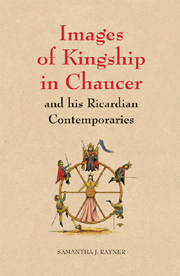Conclusion
Published online by Cambridge University Press: 12 September 2012
Summary
‘All places that the eye of heaven visits Are to a wise man ports and happy havens Teach thy necessity to reason thus; There is no virtue like necessity.’
Shakespeare, Richard II I iii 275–8Richard II's reign was marked by a particular concern to establish the king as a divinely confirmed ruler. This concern manifested itself in the construction of an image of powerful and authoritative majesty that was to prove ironically vulnerable and insubstantial under pressure. However, the poets who wrote during Richard's reign did not concentrate on portraying kings as possessors of a quasi-divine status, or directly reflect on or engage with Richard's governance; they did, as we have seen, unite instead in their focus on the individual subject's place in a kingdom beset with corrupt practices and unstable leadership. This kingdom is seldom recognisable as Richard's, and yet each poet clearly writes in response to what is happening within their immediate experience. Charles Muscatine, writing at roughly the same time that John Burrow was composing Ricardian Poetry, defined the period as one of ‘culture in crisis’, and his work shows convincingly how Chaucer, the Gawain-poet and Langland illustrate that tension in their poems. Burrow also finds common elements between the poets, concluding that
None of these poets … shows much interest in public affairs; great matters of state or city, the matters of epic, lie outside their compass. But a crowd, a company of ‘sondry folk’ massed together and displaying – often to distinctly comic effect – rich varieties of behaviour, opinion or attitude, interests them very much, not as a political force but as a conglomerate of private persons.
- Type
- Chapter
- Information
- Images of Kingship in Chaucer and his Ricardian Contemporaries , pp. 160 - 162Publisher: Boydell & BrewerPrint publication year: 2008



